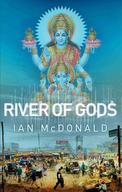The year is 2047, the setting India. It's been three years since the last monsoon and the country is dying of thirst. Countries, rather, as some years back India split into several independent states, one of which is now preparing to dam the holy river Ganga for drinking water. AI technology has grown to the point where it's possible to create AIs that are indistinguishable from people and probably far smarter. The US is terrified of such AIs and is therefore supporting the dam-building state of Awadh in return for their support of the Hamilton Acts, banning all AIs beyond a certain level of sophistication. This leaves the state of Bharat, downstream from Awadh, as a final hold-out. Meanwhile, the US space program has discovered an astroid in an impossible orbit, a vessel that may be a message from an alien race.
McDonald has reused the sprawling setting of this award-winning novel in two exceptional novellas, "The Little Goddess" and "The Djinn's Wife". He does a beautiful job with rich description and evocative settings, and both of those novellas carried a strong emotional punch and fascinating lead characters. I was hoping the novel would be even better, but while it features the same rich description and an even greater density of ideas, it rarely comes together in an emotionally satisfying story.
River of Gods is told with a large ensemble cast: a gangster, a Krishna (anti-AI) cop and his wife from the country, an advisor to the Prime Minister of Bharat, a stand-up comic who unexpectedly inherits the research division of an Indian power company, a journalist with a craving for danger, a scientist investigating the mysterious asteroid, another who has walked away from it all, and a neuter set designer for the giant soap opera Town and Country. Through this cast, McDonald shows a variety of classes and concerns and does a good job at painting the depth of his world. What he doesn't do is integrate his cast well into the plot. I was waiting for him to pull off a virtuouso collision of individual stories, but River of Gods isn't that book. Instead, everyone's life touches the others to a degree, but some are far more central and several of the threads reach conclusions that are related only through theme.
More frustratingly, some of the individual stories feel rather unimportant. I invested a lot of attention in the story of the wife of the Krishna Cop, for instance, wondering when it's going to integrate with the rest of the story, but it's only a character study and exposition of a certain viewpoint within Bharat. Some of the characters have their lives destroyed almost incidentally as part of the larger plot. And by the end, I didn't think McDonald achieved much in the way of overall coherence. The motivations behind the events of the story are explained, mostly. The main mystery of the plot reaches an annoyingly circular and "neat" solution that doesn't leave itself open to a reach for something larger. Most of the stories are frankly depressing, there are only momentary bits of sense of wonder, and McDonald's novellas in the same universe do a far, far better job at capturing the mindset of the aeais.
This book is certainly not short on ideas. I was particularly fascinated by the idea of nutes, people who have "Stepped Away" as they call it, made their bodies completely androgynous and neuter, and embedded control circuitry that lets them program their own emotional reactions. McDonald does an excellent job of describing their society, drawing on elements of gay culture (including the belief by many people that nutes are some type of sexual perversion or are less than human) but adding a unique spin. Unfortunately, much of the exploration of the idea is sidelined by other plot elements, but I liked the bits that we did get.
This is a problem for most of the ideas that McDonald generates. The aeais (AIs) lurk behind the scenes but are seldom shown openly or in their full complexity, and I know from later stories that McDonald can do a better job with them. The space exploration puzzle turns out to be frustratingly pointless. Zero-point energy serves mostly as a plot device. Aj doesn't receive nearly enough screen time and could have been developed much more, at the cost of the less-important side plots. About the only large idea that I thought got a full-fledged and fascinating treatment was Town and Country, the soap done entirely with aeai actors and featuring a huge completely made-up backstory about the actors and their lives that's as popular as the soap opera itself. This is a perceptive idea with real-world resonance that we get to see from several angles. Even here, though, this is only a fragment of the plot; I think it could have profitably driven a novel of its own (and a more focused one). I came away from this book interested in many of the ideas and mostly unsatisfied with the depth of treatment of all of them.
River of Gods has received a lot of praise, and I can see why from the excellent prose style and the complexity of the characterization and world-building. It is a technically impressive work that didn't gel for me into a satisfying story. It's an odd complaint to have, but I wanted more authorial control over the emotions of the reader, more drama, more characters I could root for, more page-turning emotion. I wanted a more entwined and united plot, even though McDonald's presentation is a more realistic cut through multiple layers of Indian society. What he did write is a beautiful portrait, make no mistake, but not a novel I can recommend that highly.
Reviewed: 2006-10-23
